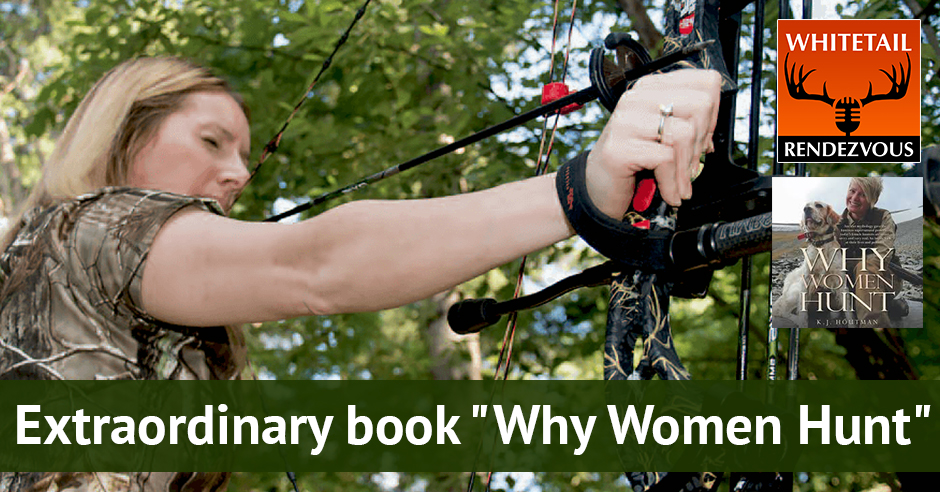
—
Listen to the podcast here:
Extraordinary book “Why Women Hunt”
Welcome to a very interesting episode. It’s a special episode because I have Meadow Kouffeld who’s been my cohost. We’ve got something special in store for everybody because Kristine or KJ Houtman is the author of Why Women Hunt. Without further ado, Meadow you know a lot about KJ and a lot about the book. Let’s get going.
Thank you so much, KJ, for joining us. It’s really great to see you. We never actually had the chance to meet in person. I was made aware of you early on. When Tom Parrow reached out to me about being involved eventually with a chapter in your book, I didn’t put the dots together. After talking to you, I had a chance to read the Zumbo book that you wrote prior to the Why Women Hunt book came out. I was very impressed with your writing style. One of the things too that I connected with you when we met over the phone for the first time was your approach and impression on folks in the hunting industry in general. I hate to put it that way like the hunting industry, but there are a lot of characters that make up a group of people that have a larger than a proportionate influence on the general public when it comes to impressions. By your advice and a few other folks, I read the Zumbo book prior to going to compete at Extreme Huntress. It definitely had an impact on a lot of the ways I think and thought about that Extreme Huntress competition. I will say thank you very much for having an impact. Thanks for joining us to talk about your book.
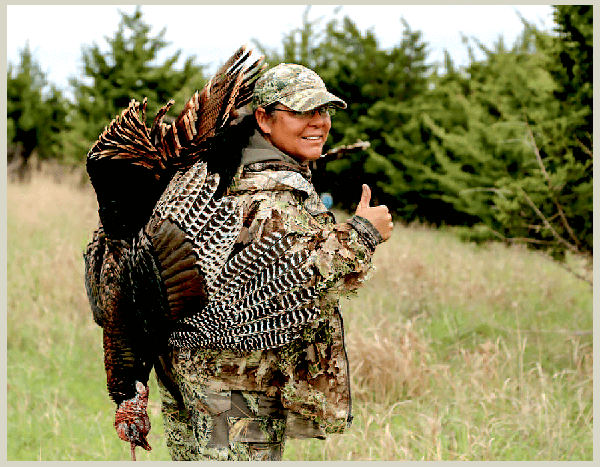
Thank you so much for inviting me. It’s exciting to hear that. I’m glad you enjoyed it.
I did. I noted that Patrick McManus was also somebody that you collaborated on that Zumbo book. You’ve got the chance to work with some really good people. How does it feel to be able to be so talented and work with those folks?
It was special. Pat McManus worked with Jim Zumbo for many years. They had many hunts together and good friends. He offered to write that foreword, bless his heart, and sent it in. I remember thinking at the time that I was maybe a tad too long. I mentioned something to Jim Zumbo about that and he goes, “Nobody edits Pat McManus’ work. Don’t touch a word.” It went in as written. What a talented writer, a very funny man. I thought Jim Zumbo’s wife was incredibly interesting. I had met him way back in the mid-‘90s when I was working for the North American Hunting Club, the North American Fishing Club, North American Hunter Magazine and North American Fisherman Magazines. I was the director of events then. We had an annual conference thing. I think I had hired Jim Zumbo to do some seminars for a conference type of thing. I hadn’t seen him for a long time.
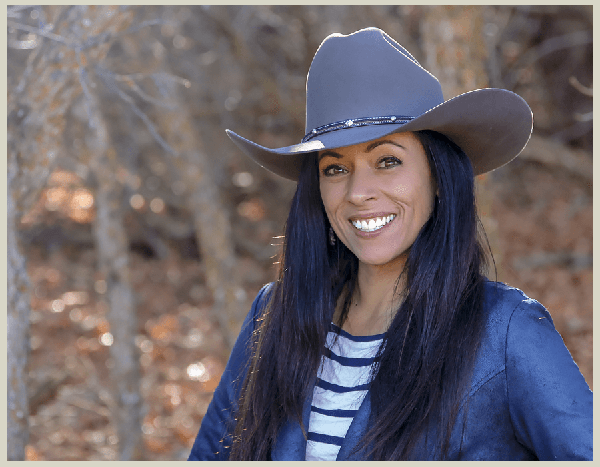
Once my children’s books came out, I ran into him at a writer’s conference. He bought my books and asked me to sign them for him. That took me a little bit by surprise. “You want me to sign?” It was fun. His story about what he went through as he stepped in a land mine with his blog was one that I thought needed to be told because I didn’t feel like how that all came down was particularly fair for who he was as a hunter, as a gun-rights activist advocate. I didn’t feel that some of the things that he had been accused of or called during the fall out on that were there for him. I was excited to be able to interview and tell the whole story, how he even got into the business. How do you get a dream job being a hunting editor of Outdoor Life Magazine? How does that happen?
I thought that was fascinating. Also, the political aspect of things and how quickly something can go so far in this day and age in such a short amount of time before somebody even realizes it. I think that was like a coming of age story almost when it comes to media and public relations. It definitely was something that I have thought a lot about since reading that book. Something so small or perceived to be so small could be taken so far out of context so quickly. I feel for them in that regard. I have never had the chance to meet them in person. Hopefully, someday I’ll get a chance to because he does seem like a genuinely great man, an interesting person.
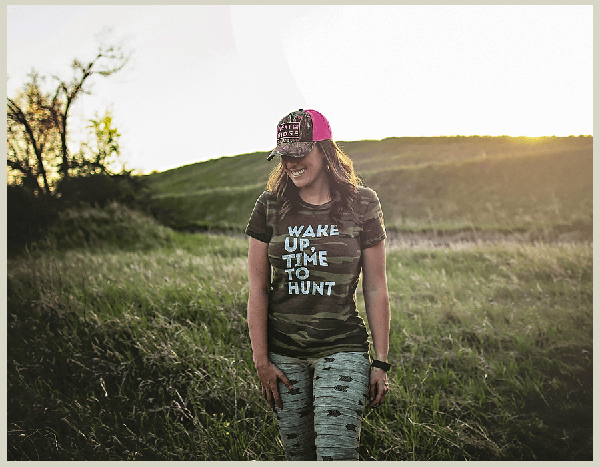
You would enjoy it. You would enjoy meeting him. You would enjoy hunting with him. He hunts or fishes every day if he can get away with it. If he can build it into his life, something that happens every day. That’s an incredible passion and work ethic. There’s not a lazy bone in his body. In his older years now he laments not being able to do some of the adventurous hunts that he did when he was younger from high elevations and rough terrain and such. Quite the stories in the book, I think, of the hunts he had.
I grew up reading him and Pat McManus’ work. It was one of those things that I never know the story behind the person. The book made him a person for me. It brought back a lot of memories. He along with a few others had inspired me a little bit more when I was younger because it was a lot of information, on stories and experiences that I would not have necessarily had especially from where I came from as a young girl in Northern California. It’s an isolated area. We have our own cultures. That periodical and their work was something that gave me exposure to the world. In continuity with their role and inspiring younger generations and people that are now hunters, you’re doing the same with your work. This latest book, Why Women Hunt, is along those lines. I can’t tell you how many people have randomly reached me to mention you’re in this book. Do you know you’re in this book? Many people have bought it in my circle for their daughters, their girlfriends, and their wives because they are interested in hunting, they want to inspire them or show them that it’s an option. The work that you’ve been doing, and with this book in particular, is continuing to build on those legacies. I think that’s one thing about this Why Women Hunt book that came out. How long ago was it?
In July 2018.
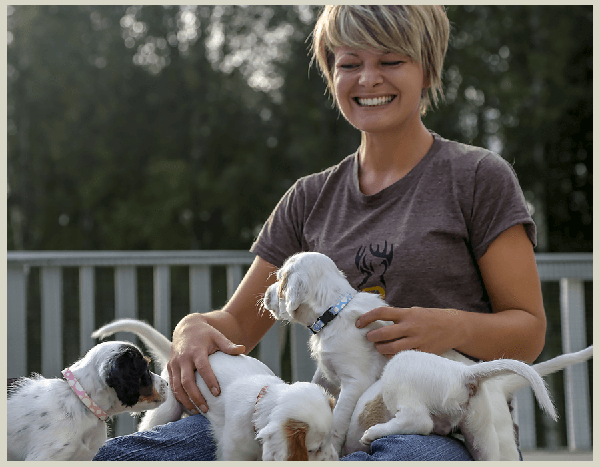
It was one of those things I wanted to bring up and touch on with you, and talk about the Why Women Hunt book and the motivation behind it.
The motivation for me, the reason why I was excited when Wild River Press contacted me to write it, first of all the recommendation came from Brenda Valentine for me to take the reins on it. I was very honored that she would want me to take on a project like that. She thought I was the best candidate for it. That speaks a lot. I asked her to write the foreword for the book, which I think is very well done also. I’m above all a storyteller. I haven’t been hunting all that long. My entrée into the hunting side is later in life. I wanted to be able to tell stories of women for how they were changed during a hunt or how hunting in general has changed them. I noticed that for me it’s something that I found empowerment, confidence, and overcoming some fears in order to be able to do things that I didn’t think I could do. I find that with ice fishing, too, not just with hunting. That’s another one of those things that I force myself to do even though I have to push it a little bit because there’s a certain amount of discomfort there. I do it anyway. There’s something there like good happens when you push yourself to do something that’s hard. I want to be able to tell the stories of a diverse group of men, and the diverse ways that they entered hunting.
Not everyone was like you, where they grew up from a tiny girl, hunting with their sister and their dad. You can’t even remember a time when you weren’t hunting. For me who picked it up later in life, when I would meet someone like you or someone like Brenda Valentine. I would hear about your story like that, I would be a tiny bit intimidated and feel a little bit like, “It’s too late. I didn’t get raised that way. It’s not my thing. More power tower to her. It’s her thing.” I didn’t have that. I didn’t even have encouragement. My story in the book, I don’t know if you read, but my father was questioning even why I want to take firearms safety when I was in sixth grade. He didn’t even support me in that really. I wanted to be able to show that it’s certainly possible. I have quite a few women who came to hunting from different paths. Sometimes it was in their 30s, 40s or even 50s. I thought that was a great way to be able to show that it can happen in unique ways at different times. We’re not all cut of the same cloth, that we were raised by a dad that brought us in the field. How can it still be an opportunity for everyone?
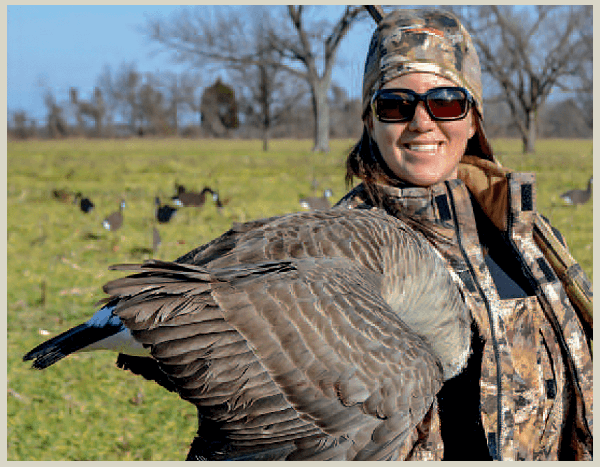
It’s important that people that started later in life tell those stories. I completely agree with you on that because I struggle with our tree, the hunter recruitment or attention reactivation sometimes and be able to relate with people that are coming into it at an adult stage. To not be intimidating with my experience or my background. I definitely feel that when I’m trying to reach out or communicate with women, men, people that haven’t hunted before. I get that. For example, like music, it’s one of the things I’d love to be able to play the guitar. I didn’t start when I was young. I’m too old for that now. I don’t have time. My mental flexibility isn’t there. My dexterity isn’t there. It’s in the same sense as hunting. That’s the only way I can relate.
People playing instruments or people picking up something new that is technically challenging, or maybe put you in a less than comfortable position. I can relate to that. I feel like it’s very important for people that are new to hunting or haven’t grown up hunting to tell the stories and to be involved with recruitment in large part because they know. They can communicate that story. They know that feeling. I do, as a professional and then also as somebody who works to brings folks into hunting, I know that I missed some big-picture items there, some big points and communicating with those folks. I really appreciate your work because it is coming from somebody who has life experience but is new to hunting relative to say someone like myself. Thank you for that. I do appreciate that.
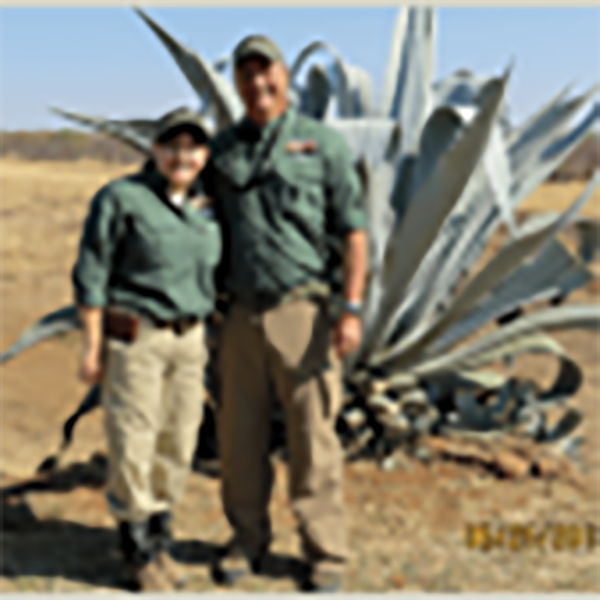
Thank you. One of the things I thought was important by telling these different stories, there are eighteen stories that make up the book Why Women Hunt. I did not go out and try to find eighteen of the absolute most well-known, most skilled. All eighteen are going to be at the very top, the cream of the crop. You might be. Brenda Valentine for sure is. I’m saying that my motivation for who we were going to interview was more of an interest in different kinds of stories. It’s important to know that we can come at this from different directions. Someone might not be a big game hunter. Someone else might. Another woman might be interested in Safari in Africa but someone else might simply enjoy turkey hunting. It’s important that we tell these different kinds of stories. We don’t necessarily try to say that someone has to be everything. I’ve had to put that, released some of that pressure on myself.
Getting into this later in life is that I’m not wired like so many who every week out of the year can plan the preparation of or the execution of or the meat processing of before, during and after. The management of food plot, etc. It’s a 52 week a year’s role. I say that in Jim Zumbo’s as I interviewed him and brought his life story in that book. I know that that’s life from some of the hunters that I know, read or respect. I also wanted to show that that doesn’t have to be everyone. You can enter and choose where your comfort zone is at. I know for me my comfort zone earlier on was fashion hunting, even just dog training, being out in the field with some chuckers. Walking the field with a shotgun like, “No, I’m fine with this. This is good.”
Something good happens when you push yourself to do something that’s hard. Share on XSomehow I stretched. For me, it was when I was writing that Zumbo book and he was America’s Western big game hunter. The challenge for me was you need to know the space better. You need to be a part of it. I was able to do long-range rifle training to build my confidence. One, my confidence came in and I’m being able to take a shot. I was a little more comfortable being able to go out. That very first time that you dropped an animal, there is that moment. It happens every time to be honest. There’s that breath. It’s that moment. It’s why you’re there. You’re thankful for that animal, for the experience, for the time alone, or the time with friends or family. You’re thankful for the meat. You’re thankful for the hunt, the way it unfolded.
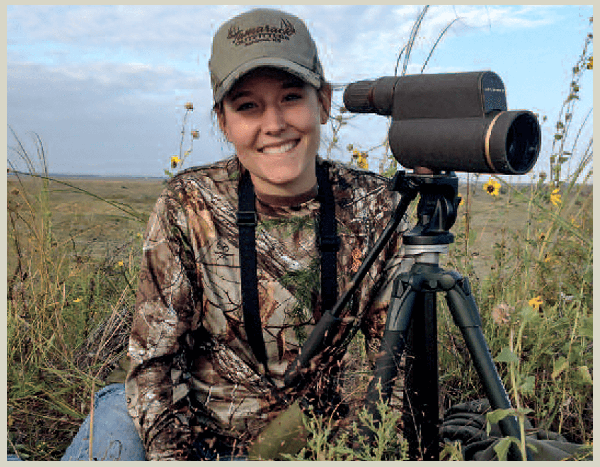
Sometimes it unfolds beautifully. There’s that success like everything came perfectly. Sometimes it’s not. I write about that a little bit too where maybe the shot isn’t perfectly placed. Maybe there is a little bit of panic. Settle down, you’ve got to finish this. That’s the reality too. It’s hard work. Especially for non-hunters, I wanted this book to be something that someone who was a non-hunter might also enjoy reading to understand a little bit more maybe what it is. There’s a lot of confusion from non-hunters about what hunting is.
I think there is. The thing that you present, it’s a wide range. It’s not this top twenty ladies and hunting. The thing that struck me immediately when I thumb through the book for the first time and I looked at all of these different faces and these different stories, that diversity, that range. Folks have asked, “How did you get into it?” I was lucky. Tom contacted me and asked KJ to talk to me. It was really by random chance. It wasn’t because I was exemplary or anything along those lines. It was that I was along this line of a spectrum that they showed in the book and they hosted. I think that one of the powers of the books is that no matter where you are in your hunting career whether you’re beginning or you’re retiring, you’ve gone through a full life, you see yourself in there.
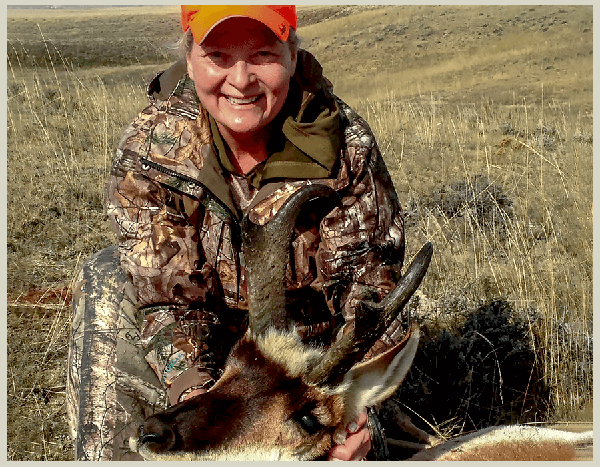
I hope so. Intentionally picked a couple of gals who have been hunting, but haven’t harvested their own animal yet. That was another goal of mine. I really don’t feel that it has to be all about the kill. It’s an important moment. If you’re willing to learn, if you’re willing to practice with a bow, if you’re willing to go out with a husband, let’s say, which I believe is the story of one of the gals in there that hasn’t taken her own animal yet. You’re willing to be a part of that and be out there. Along with when he harvests, and you haven’t yet but you’re ready for your opportunity. You sit in a blind and have a black tail deer hunt opportunity for you. You haven’t taken the shot. It hasn’t been the right one for you yet but you’re ready. I thought that was important to tell, too.
I have a very good friend who let me turkey hunt on their farm. She doesn’t hunt. Her husband doesn’t turkey hunt, he deer hunts. They let me turkey hunt on their farm. She likes to go sit. Sometimes she’ll sit with me or sometimes she’ll sit with him. Notice I had to take a gun. I didn’t write about her in the book, mind you, but I think that there’s any level of participation that opens the door. It creates an acceptance of hunting because such a small percentage of Americans hunt. When you think of it as women, such a small percentage of women hunt. We really need the support and encouragement from those who don’t hunt. I hope that they would see why we do this is so much more complicated than just putting meat on the table. That’s an important component of what we’re doing. I could spend a lot less money. Put meat on the table. There’s definitely more to it than that. I hope that with all these stories that a part of it unfolds.
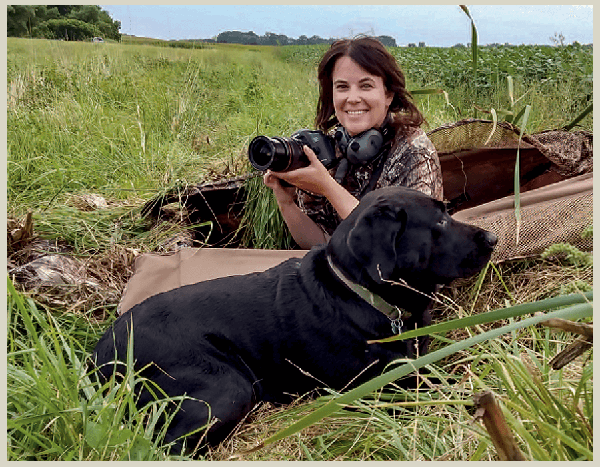
I think that was one of those things I thought about. Why was this person here? Why was this person there? In every range, you think about it. You mentioned that support of hunting or that social support of hunting. Even if someone goes through say an archery program or they go on their first deer hunt or a couple of deer hunt, maybe it’s not something they’re ready to, maybe it’s not their time to pull the trigger. Maybe they said they never want to but at least they’re supportive of it, or they come out with an understanding of it. That book also ads to that because it’s very important that people that are becoming hunters or that our hunters are in an environment that’s somewhat socially supportive of hunting in order for them to continue to become hunters or maintain themselves as hunters. Without a social support network, a lot of people drop off when it comes to hunting and participating in hunting. I’m definitely with you on the lines of ladies that maybe our support role more than anything. They enjoy that aspect. They don’t hunt. There are ladies like that, that is as important in some respects, especially with the women having influence over their families.
Especially raising children. My outdoor experience also has a great deal to do with sharing that message with children. I’ve written six children’s books that are adventures about fishing, camping and hunting. I’ve talked to schools. I’ve enjoyed the time that I’ve to spend with third, fourth and fifth graders talking about the outdoors. When I ran the Masters Walleye Circuit, we had a lot of clinics. At our turn-ons we had little clinics or skill-building days. The goal was always to get more participation. I’ve been involved in this industry for such a long time. The outdoors that I think one of the ways we can get people involved is for them to read the stories and then start to anticipate themselves on how they fit into the story. I can’t take your role. I could never take the role of someone who could compete at an Extreme Huntress competition as you did. I don’t have those skills. I didn’t start this until a few years ago. I’m late for the party to building those skills. I have to overcome so much, too. I’m still in it and I’m giving it a try, but how great is it if we can open the door to entire families? I do think that moms particularly are gatekeepers for whether the family is going to enjoy the outdoors together.
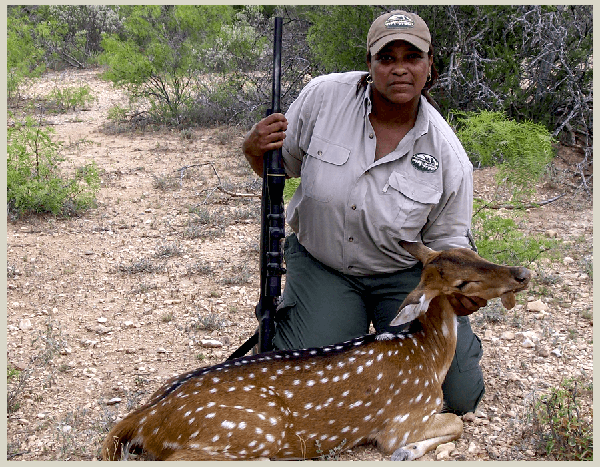
When I was a kid, we received these 1930s or ‘40s books that the library discarded. They were like Hellboy Sand books and the ranchers and skunks spraying the cow dog. It was real life stuff. They hunted, they fished, and they did real-life things. Now when I look at the books for children in the stores, they’re so far removed from the natural world oftentimes. There are no realistic or not very many common sense children’s books related to the outdoors. Your contribution is pretty great, much more so than any one person who hunts a lot or is capable in the field because of years and years of experience. Your impact is much broader because you are reaching a very broad audience in a format that is lacking elsewhere. I thought a lot about children’s books now that I have a six-year-old. The lack of support for hunting and fishing in children’s media alone is not very encouraging.
I think one of the challenges in society and our books are reflecting this in some way, is that we have to always think about being safe. It’s gotten almost to an extreme that if you would ever consider doing anything that someone else deemed us unsafe, you got this conflict. The challenge with the outdoors is someone can get hysterical about there are ticks out there or there’s a big flashing sign at the boat ramp all winter long, no safe ice. We have to counter the messages that are out there that you can be outside and be safe and enjoy it and not be afraid. I grew up being afraid of so much. One of the absolute treasures of becoming an outdoors woman has been conquering that fear, finding the chutzpah to get out there and do it. Can I walk through the woods, calm down, and not worry about snakes or sit in a ground blind, not worry about spiders. I still have a little worry about grizzly bears.
I think that’s a healthy worry.
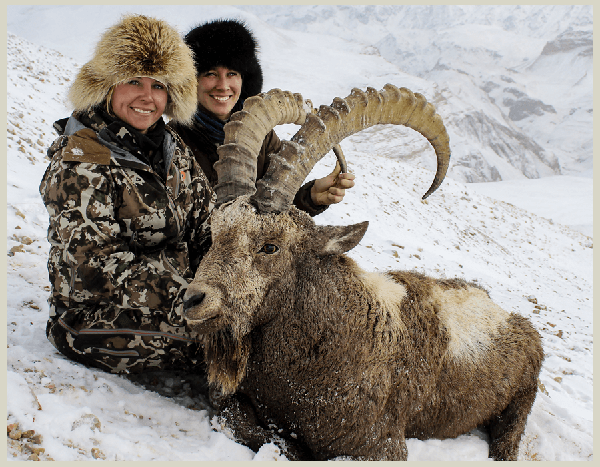
That’s a good one.
That’s one of the things that as women, we can do for our kids to come up in the outdoors is to show them that we can conquer that fear. We can manage it. We can address it. We can do the things that we need to do to be safe. I spray my clothes down the night before with the tick guard spray. I roll it up and let it sit there all night long. The next day when I get ready to go out into the turkey woods, I feel ready. I’m not going to worry about every tick in every woods. I’m going to go do it. It’s a good thing.
I often wonder about that, but maybe people think I’m reckless because I’m always out and doing things but I think that it’s because I was raised so different than the average person. It’s hard to communicate or understand those hurdles that are new hunters based. Maybe my parents were reckless. I often wonder how did I survive. It’s the same for my sister.
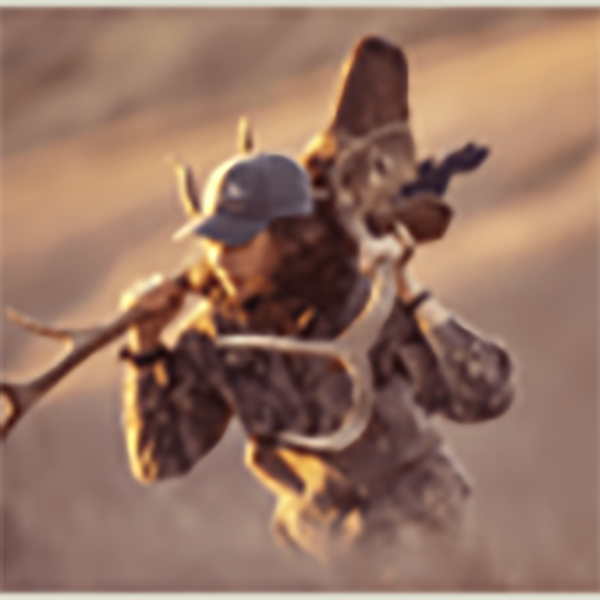
No bike helmets for you, Meadow.
No, I’ve got the scars to prove it, I promise. My sister, she went and she spent the night in the wilderness area, in the middle of nowhere. Not even batting an eye about it, shot a buck and packed it out. For me that’s normal. For the average person, it’s not and it’s hard for people like me that want to promote hunting is to recognize those things, the hurdles that get people, that you have to get past. Especially when you’re an adult and you are raised to be fearful potentially of the outdoors, the unknown and the wilderness, being away from hospitals.
Moms particularly are gatekeepers for whether the family is going to enjoy the outdoors together. Share on XAre you going to be safe? It’s a big thing for now. I think schools are constantly and rightfully so because of sometimes how unsafe some of our schools have become. That’s a message that’s shared a lot. We need to find a healthy balance because being outdoors is a very healthy thing to do. As I interviewed these eighteen women in this book, some of them talked about the incredible time they had alone. It was that solitude. It’s regenerating and rejuvenating. For some, it’s almost spiritual. For some, it’s a way to firmly plant your feet on the ground, feel rooted and secure. What’s happening around you is real. It feels good when you can connect in nature. For some other women, there were a lot of stories about wanting to be with friends or family members when they were outdoors.
There was this camaraderie and the experience of doing something together, and making food together, or the memories themselves of the hunt, the preparations or the travel. Either way, it’s okay. Some women were drawn to a big, dangerous hunt like in South Africa. There were other women that that’s never crossed their mind. I do think it’s important as you start mentoring and working with new people or young people that you find out where their interest is. Start there rather than overwhelming with everything that it could be. If you can narrow it down so that it isn’t quite so big and find where that interest is, we might find someone that’s simply interested in walking in the turkey woods. Maybe that’s the thing that they get started with then more might come later. Just start.
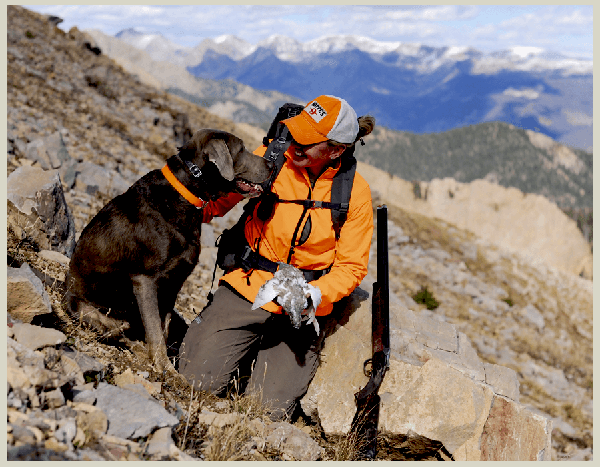
I like that, to focus on something smaller and more narrow. It’s a challenge sometimes, for myself, to focus on something smaller and narrow. That’s good advice for people.
The first time that I realized that I could go hunting was when I was sturgeon spearing. That’s in the book in my story. As I’m staring down this dark hole with just a little bit of the daylight coming through from my decoy at the bottom, and then there’s a little X at the bottom for being able to see this big, pitchfork type spear is next to me in the dark house. I’m intently watching and waiting. I had gotten invited to this event because I was in the fishing industry. The more I sat there, the more I was like, “This is not fishing. There’s no catch and release about this.” If a sturgeon swims in front of here, I am spearing him and he’s dead. This is more like hunting to me. This is a harvest. I’m waiting for the opportunity. I’m excited. My adrenaline is up. I’m having incredible anticipation when the hour ticks too close. I have to leave the dark house and there’s a bit of remorse. If it didn’t happen now but maybe tomorrow. That was where all of a sudden I realized I could sit in a stand. I could do this. My enthusiasm was there. That was the beginning of how it opened up for me.
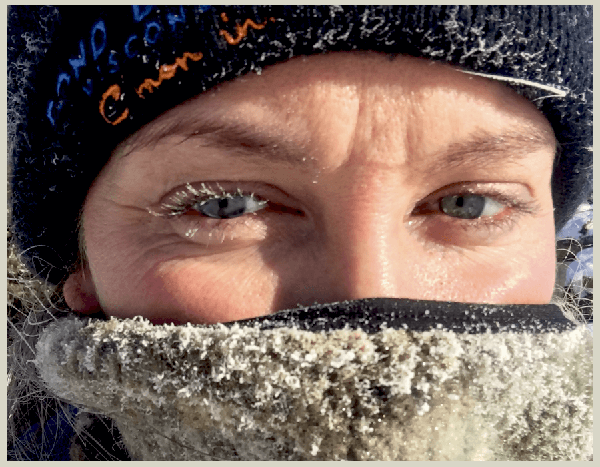
I remember reading that. That’s a great story. I’m glad that you’ve decided to take on hunting. I’m really appreciative of the work that you did with this book. I hope that people continue to find inspiration in it like I did and understand the purpose, too. Many people are focused on the list of the best, the biggest and the baddest. The book is beautifully done. It covers a beautiful site, a cross-section of women and hunting. That’s very powerful. That’s a very unique and powerful part of that book.
Thank you so much. I am hopeful that men along with women will enjoy reading the book. I would strongly recommend buying it as a gift for men. I don’t know if they would be so inclined to click on it and order it, maybe. If someone is reading this and thinks, “I think I will get that for him. He’s an avid hunter.” It’s good for the men also to read the stories of how some women came into hunting. They might realize that not everyone launches in and goes crazy and starts every single hunt they can find. The first time you ask and they said yes. “Do you want to go into the field with me, honey?” “Sure,” the very first time. Nancy Jo Adams’ story is the first chapter of the book. Her husband probably asked her to go hunting with him for several years. She said no. She didn’t even say no very nicely. Why would I want to do that? The story backs up. A little bit of the back story is why on that one day after Christmas she said yes. She did. She loved it. Even that very first year, she took two deer, one with a rifle, one with a muzzleloader, a bear with a bow, turkey. That was the first year. That’s incredible that you would jump in that full force.
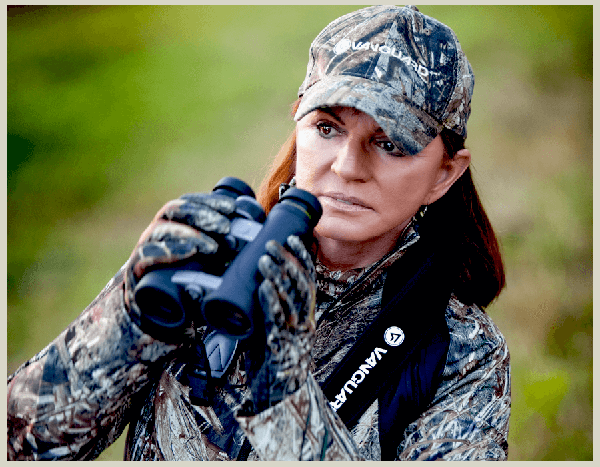
At first, I think too it’s important that men that maybe are interested in hunting or maybe they never even thought about it may even see the book. There are plenty of men not just women that didn’t have the opportunity to take hunting and fishing on for that matter as children. It serves in this modern-day also as a role model and inspiration for men as well. It’s not limited certainly to women in that regard. Not only for men that may be interested in hunting, but there are plenty of men that are hunters and would find the stories interesting and then also be able to relate more to the wide range of women that are hunters. It’s a great idea especially with Christmas coming up here.
It’s a beautiful coffee table.
It’s a coffee table book for sure. It’s beautiful.
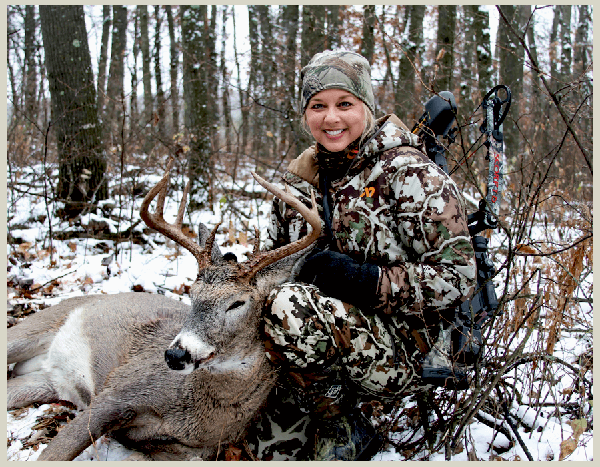
It’s got some beautiful photos in it. It’s a really lovely book for a gift, hardcover and well presented, beautiful quality. I may say too that in the process of sharing the book, it’s a step of mentorship. If there was one theme that rang out throughout the book in interviewing these gals was that the need for a mentor is so significant. It doesn’t have to be a woman to mentor another woman. It can be. No one can take this on without someone mentoring. There’s too much to learn. You can’t learn it all at the moment. Someone else has to narrow it down for what do you need to know first. Once we have this moment, a field, what can we add on and build on? How can we build on the knowledge and build on the confidence and encouragement? I had a couple of friends take me out into the turkey woods before my first turkey hunt because I was nervous. They said, “Let’s just go.” We camoed up and off we went. We didn’t have any guns. It wasn’t even seasoned yet. They showed me how to walk and where to take a seat by a tree. They did some calls. They showed me. I was able to listen. It was all in this teaching moment. I’m thankful to those guys for caring enough that my first hunt would be a good experience by having a practice day. How nice is that to be a good friend?
They did a good job. That might also be another source of opportunity from the book is that maybe it will inspire a few to start small. For those some of those ladies you covered that aren’t full-fledged into shooting and harvesting animals every year, it’s maybe also such expectations too at a certain level. It’s okay that if that’s where it starts, it’s where it starts. Is there any one thing, KJ, that if you were to say something to other women, after finishing this book and having talked to a lot of ladies in the industry, knowing a lot of women in the industries. Is there any bit of advice or maybe one thing about hunting that, because you’re special, you’re new, you have a newer perspective? One thing about it that you would say or encourage someone to maybe try it?
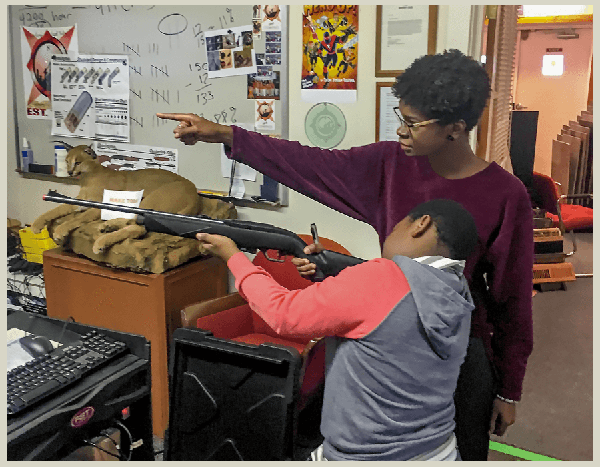
I would say that women are out there who are organizing women hunts or skill-building events like becoming an outdoor woman or such. Nancy Jo Adams had a hunt or two every year where she invites other women to go. I know another gal who runs a program. It’s not hunting. It’s Wisconsin Women Fish. She encourages hundreds of women in their quest to be good anglers. They have a lot of support. Whatever it is in the outdoors, I’d say know that there’s probably another gal out there who would love to be able to encourage, share and mentor another way. Sometimes we put an awful lot of pressure on that. For example, I feel like I’m still so new that I don’t mentor. I’ve had a number of people tell me that’s not true. You do it in different ways. I would say if you can, find somebody that you can pair up with whether it’s a one-on-one pairing or it’s a group. That support and encouragement are really helpful. It’s a safe place to ask questions. I would also say to the guys that are going to be reading this, ask your wives, ask your daughters. Don’t’ stop asking nicely. The opportunity is there and they’re welcome. Do what you can to help create experiences that they’re going to want more.
You never know when they might change their minds.
That one thing, maybe they didn’t carry a gun that day, but you took them out into the grass woods with you. They had such an incredible day. They’re like, “I want to do this again.” You build on that. It’s important not always to think that it has to start with a big game and a long rifle shot. It doesn’t always have to start with that. It’s great to see where their interest lies. Maybe they hate the idea of cold so they’d be much more open to bow hunting in the little earlier season or something. It’s a good way to try that, start that. Maybe it would be a great way to take a trip and hunt a little further south. Maybe that’s something that this avid outdoorsman husband might not take that trip on his own. He might be perfectly fine in the land that he hunts up north or something. If you went down south, it’s to take your wife and daughter something. Maybe it’s just a bit warmer and you got them to experience it in a way that they loved it. You can always layer up and stay warm after that.
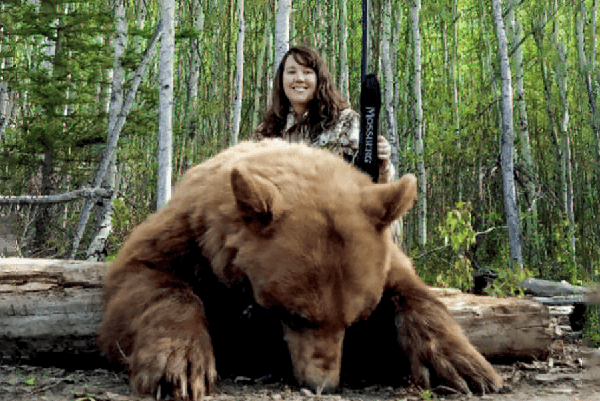
I believe the initial spark, the initial motivation to see something that they do like. To allow that opportunity for that experience and environment where there’s no detractor, like negative four degrees in snow. Thank you so much, KJ. I really appreciate you coming on. I hope that someday we get to sit down and have a coffee together as you’ve offered.
I look forward to that. We’re not that far apart. We need to do it.
I know it will happen.
KJ, how does somebody buy your book please?
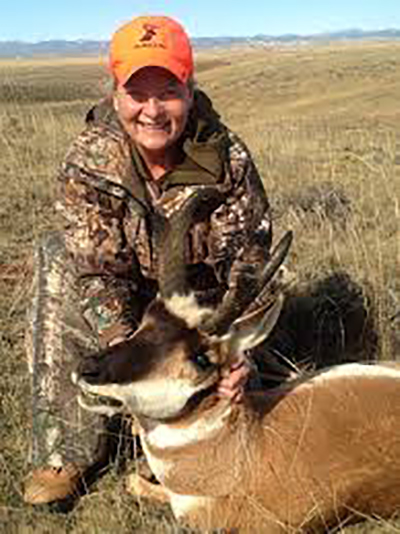
WhyWomenHunt.com is the website. It’s $49.95, a beautiful hardcover, quality picture, coffee table book. I think that’s the easiest way to find it. You can also go to the Wild River Press website.
Is it on Amazon?
No, just at the Wild River Press outlet.
If somebody wants you to autograph it, how would that happen?
I would say still contact through Why Women Hunt. Order it. There’s probably a place for notes on there. Tom has asked me to sign some and mail some out. We have a way to make that happen. My other books, my children’s books are at Amazon. I have a Christian devotional that is called Reflections Under the Big Pine that I co-authored with Bill Miller. My Zumbo book Meadow was talking about, those are available at Amazon all on my author page. You could search for KJ Houtman.
Do you have any final words?
I want to thank you for the opportunity to talk about this. It’s important to open up the outdoors for families. I do think that many times the women are the gatekeepers for the whole family to participate in the outdoors. It’s great to build that support in a family. I’m happy to share these stories of these amazing women. Meadow’s stories are incredible, of her hunting all over the world. The book, you’ll enjoy it.
Meadow, as always it’s an honor to have you along for the ride. Thank you so much for your time and effort. KJ, it’s an absolute pleasure. I look forward to sitting down with you and your husband, having tea or lunch.
That sounds good. I look forward to it. Thank you.
Important Links:
- Why Women Hunt
- Zumbo –
- Buy Why Women hunt and get a companion book on the life of Ionic Jim Zumbo. Use code “ZUMBO”.
- Wisconsin Women Fish
- Wild River Press – Why Women Hunt
- Reflections Under the Big Pine
- KJ Houtman – Author page on Amazon
- https://www.WhyWomenHunt.com/
- https://www.WildRiverPress.com/product/why-women-hunt/
- https://HuntTested.com/why-women-hunt-book-review/
- A free companion with purchase of Why Women Hunt (available at www.whywomenhunt.com).
- www.fish-on-marketing.com
About Kristine “KJ” Houtman
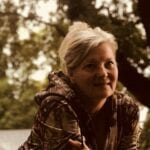 An outdoor writer from Lake Minnetonka, Minnesota, K.J. Houtman’s 25-plus-year career spanned outdoor industry organizations including American Sportfishing Association, the North American Hunting Club (and Fishing Club) as well as nine seasons running the Masters Walleye Circuit. She authored Fish On Kids Books to introduce middle school-age readers to the fun adventures around fishing, camping, and hunting. Outdoor Adventures with Gus continue in the National Wild Turkey Federation’s Jakes Country magazine.
An outdoor writer from Lake Minnetonka, Minnesota, K.J. Houtman’s 25-plus-year career spanned outdoor industry organizations including American Sportfishing Association, the North American Hunting Club (and Fishing Club) as well as nine seasons running the Masters Walleye Circuit. She authored Fish On Kids Books to introduce middle school-age readers to the fun adventures around fishing, camping, and hunting. Outdoor Adventures with Gus continue in the National Wild Turkey Federation’s Jakes Country magazine.
Along with hunting editor Bill Miller, Houtman co-authored Reflections Under the Big Pine, a Christian devotional around hunting- and fishing-themed stories. In 2016 she authored the life story of Outdoor Life magazine hunting editor Jim Zumbo, entitled Zumbo. Houtman’s books and articles earned awards-in-craft honors from Association of Great Lakes Outdoor Writers and Southeastern Outdoor Press Association. She served as a board member of the Professional Outdoor Media Association and Future Angler Foundation. Houtman is a founding member of the Women Ice Angler Project, a media event with a team of eight women led by Barb Carey (now in its sixth year) showcasing women ice anglers.
Writing was one of the ways Houtman learned to meet her fears head on, and it opened the door to hunting for her, albeit later in life. “My best writing occurs when I’m able to tell a story with a focus on someone else’s outdoor adventures,” Houtman said. “I enjoyed the project Why Women Hunt for that very reason with incredible ladies and diverse backgrounds, yet each shared a hunt that changed them. It’s an important thread in these moving stories.”
